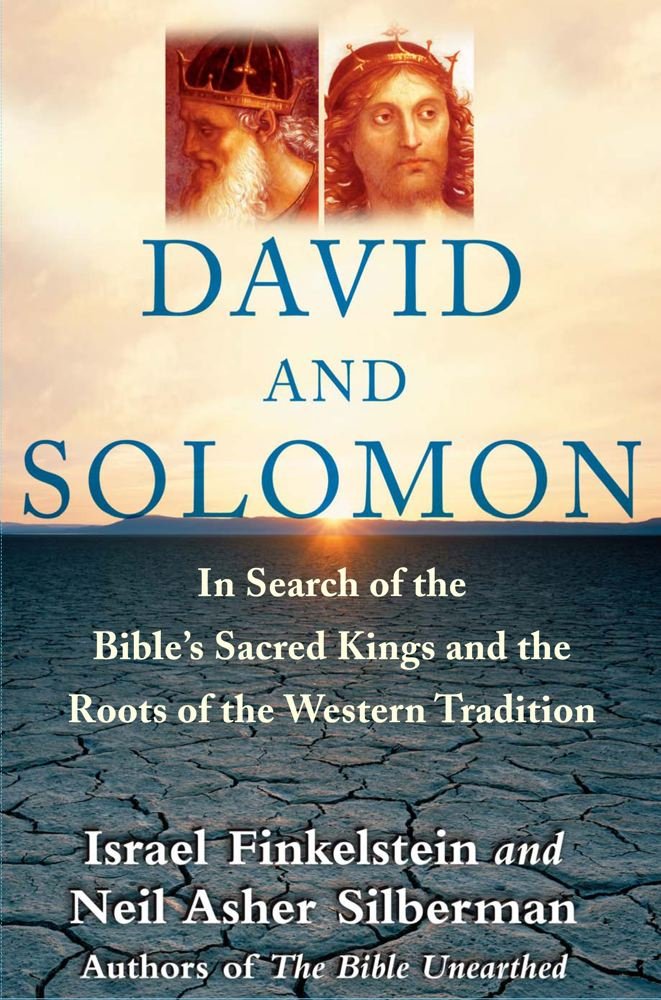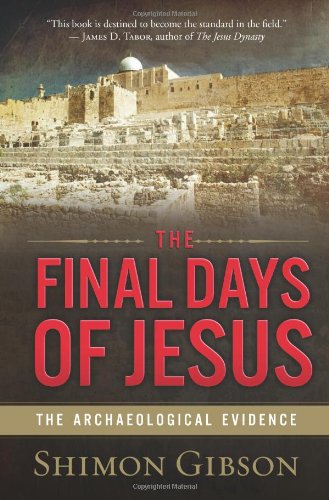Book review: David and Solomon
by Israel Finkelstein and Neil Asher Silberman
★★★★
A Finkelstein book will be controversial; let’s establish that up front. And because there exists very little archaeological evidence outside the Bible story of Judah’s first kings, speculation will be a natural result of any such study. We know absolutely nothing from history about Saul and precious little about David and Solomon; in fact, the evidence is so sparse that a few scholars still doubt the existence of all three.
Finkelstein and Silberman don’t doubt, but neither are they able to provide 342 pages of historical analysis. Instead, they trace the legends of these early kings through a thousand years of Hebrew writings, both in and out of the Bible. The earliest folklore and Bible verses about David show him as a bandit leader of a small gang of traveling raiders. Later authors portrayed David as a poet and a founder of a great dynasty, as well as a sinner. Solomon’s reputation, as well, grew over time into a shrewd trader and wise sage.
How many of these writings are based on fact, and how many on legend? The authors’ scholarly research and field experience will make you reconsider.

Genesis 2:18, Man’s Helper
The Lord God said, “It is not good for the man to be alone. I will make a helper suitable for him.”
//So God made Eve, right?
Nope, read your Bible. God made animals. Lots of them, and paraded them before Adam, so Adam could choose one for a “helper.” Picture it: Along comes the giraffe. “Uh-uh.” The hippo. “Forget it.” The snake. “Ewww.”
But for Adam no suitable helper was found. So the Lord God caused the man to fall into a deep sleep; and while he was sleeping, he took one of the man’s ribs and closed up the place with flesh. Then the Lord God made a woman from the rib he had taken out of the man, and he brought her to the man.
And Adam said, “Yowza!” Well, ok, he really just mutters something about bones and flesh, but he seems happy. Adam spurns the giraffe, the hippo, the snake, and chooses the woman. What do you suppose happens next?
The ol’ snake comes back, in an apparent jealous rage. He targets Eve, feeds her an evil apple, and Eve feeds Adam. Their eyes are opened to know good and evil. Now Adam says “Yowza!” Lo: Along came children, and the earth is populated.
I absolutely love this story! Religion was so much more fun back in those days, while God still wandered in His garden calling for His humans. Before God grew omni-everything and the snake grew satanic. Gimme that old-time religion!
Got an opinion? 0 commentsBook review: Pagan Christianity?
by Frank Viola and George Barna
★★★★
No, this isn’t a “bash the Christians” book. It’s a “bash the church” book (lowercase “c”). The authors’ goal is to redirect Christians back to the original teachings of the New Testament, where the “Church” was never a building.
“Pagan,” as used by the authors, pretty much just means “different from what the New Testament teaches.” Their goal is to encourage Christians to embrace the original New Testament church.
Church buildings are wrong. Sacraments are wrong. Collection plates are wrong. Pulpits are wrong. You’ll get a earful, and if “wrong” means “not the way it was first done,” then the authors have a well-researched point. But an important distinction needs to be made: The New Testament church, in this book, should not be confused with the “first century church.” No extraneous Christian teachings are acceptable to Viola and Barna, who either ignore or condemn them. Even if some of these teachings are contemporary with New Testament writings. For example, church fathers Ignatius, Clement of Rome and Tertullian are criticized for introducing a clergy, and the Didache’s instructions are never mentioned by the authors, who insist that early Christian worship sessions had no structure. Perhaps the authors subscribe to the view that all of the New Testament Gospels and epistles were written in Paul’s time.
Part of the intrigue of this book, for me, is that I grew up in a nondenominational church similar to what the authors approve of as “organic,” and that ignores all Christian instruction outside the Bible. This church has a bit more structure to their worship than what Viola and Barna recommend, but it does meet in homes and all members participate equally in the service. It’s a “back to Jesus” movement patterned after the New Testament.
So, my church background may qualify me more than many reviewers to address both the pros and cons of the book’s arguments. And as such, I do have one criticism, which drops it from a 5-star to a 4-star rating: The passion of the authors overflows, which should be a good thing, but here it’s overwhelming. While they convincingly show that many Christian church customs differ from the first Christians, their underlying assumption that this is somehow bad gets pushed a little too hard for my taste, simply because in my experience, different church atmospheres and practices are appropriate for different people. We’re all unique, and different things bring us closer to God.
But enough nit-picking. The book has a serious message for all who wish to pattern their manner of worship after the Bible.

Acts 10:38, A Good Man
God anointed Jesus of Nazareth with the Holy Spirit and with power: who went around doing good and healing all who were under the power of the devil, for God was with him.
//Today’s verse is a call for Christians to unite. Whether you see Jesus as a wandering first-century sage or a cosmic Christ, there is one attribute of his that all of us can agree on: compassion. Jesus cared. Jesus “went around doing good.”
Whether “God” refers to a synonym for love or a white-bearded “Ancient of Days” looking down from the sky doesn’t change the verse. Whether the “Holy Spirit” is a living, personal third of the Holy Trinity or a mysterious, warm presence bubbling up from within your being whenever your thoughts turn to compassion, may not be important. If you think of “casting out devils” as more of a figure of speech than a warfare against supernatural villains, you might be surprised that even some first-century Christians agree. There are no exorcisms or devils running amok in John’s Gospel.
What we can all agree on is what Jesus taught: Kindness, compassion, love, respect. That’s what it means to be a Christian.
Got an opinion? 0 commentsBook review: Paul
by Walter Wangerin Jr.
★★★★★
You may know Wangerin from The Book of the Dun Cow. I love Wangerin’s writing and I loved Paul. From the insatiable and inexplicable drive of the book’s hero, Paul of Tarsus, to the endearing antics of his biggest fan Titus, this is a captivating story in a fascinating era.
Wangerin knows his Bible; that much is clear, yet he makes the Bible fun. When you grow up in a church atmosphere, Bible characters become legend, untouchable, bigger than life. This book brings them back to earth and gives them breath. Paul, especially, becomes human again. Love him or hate him, you will admire him and shake your head in wonder at his passion.
Readers of my reviews know fiction is not my favorite. It has to be historical and well-researched, it has to be thought-provoking, and it has to be moving, for fiction to make the top shelf. This one has it all.

Jude 1:14-15, The Book of Enoch
Enoch, the seventh from Adam, prophesied about these men: “See, the Lord is coming with thousands upon thousands of his holy ones to judge everyone, and to convict all the ungodly of all the ungodly acts they have done in the ungodly way, and of all the harsh words ungodly sinners have spoken against him.”
//These verses in Jude are a direct quote from the ancient book of Enoch, chapter one, verse nine. Enoch was quite popular among first-century Christians: Jude, 2 Peter, and Revelation all freely quote from Enoch. One can hardly make sense of parts of Revelation without first reading the tenth chapter of Enoch, but in the fourth century, the church suppressed this book as heretical due to its references to the physicality of fallen angels (called “Watchers”), accused of having sexual relations with the “daughters of men.” Yet, Genesis 6 confirms this story, where we learn about the offspring of the Watchers, called “Nephilim”: In those days, and even afterward, giants lived on the earth, for whenever the sons of God had intercourse with human women, they gave birth to children who became the heroes mentioned in legends of old (NLT).
The blacklisted book of 1 Enoch remained underground for 1400 years until rediscovered in 1773, though more recently it surfaced several times among the Dead Sea scrolls, which pushes its date back to at least 100-200 BCE, and presumably earlier.
So what do you think? Is Enoch inspired scripture or not?
Got an opinion? 0 commentsBook review: The Final Days of Jesus
by Shimon Gibson
★★★★★
If you’re interested in the historical Jesus, you’ll be fascinated by this book. Shimon is a thorough researcher and archaeologist. He is up-to-date on current scholarship, while at the same time providing new insights and theories, with a writing style that keeps you reading. Shimon excels in vividly portraying the everyday life of Jesus and his times. You’ll learn the geography, the rituals, and the lifestyle of first-century Jews as you walk in the shoes of Christ through the final days of his life.
Shimon cautions that “some of my conclusions regarding Jesus and Jerusalem may be controversial,” but throughout the book I found all of his arguments to be logical and carefully documented.
I’m one of those fanatics that marks his books up with highlights and margin notes, and this is one of those books where I’ve got bright paragraphs and blue ink on every other page. I sometimes look over my notes as I prepare to write my reviews, but I simply don’t have the time to reread everything this book taught me. I’ll just leave it at this: If a book’s value can be measured by how much you learn from it, then this one deserves the praise I give it.

Genesis 6:19-20, Two of Every Kind
You are to bring into the ark two of all living creatures, male and female, to keep them alive with you. Two of every kind of bird, of every kind of animal and of every kind of creature that moves along the ground will come to you to be kept alive.
//Many people recognize that there are two creation stories in the Bible. Chapter 1, plus three verses of chapter 2, is written by a different author than the story which begins in verse 2:4. The first story, which details the seven days of creation, was penned by an author Bible scholars call the “Priestly source.” The second story, which emphasizes the Garden of Eden, was penned by the “Yahwist.” The writing styles are different, the words used for God used are different. (Yes, the Yahwist is most easily identified by his use of God’s holy name: YHWH).
But did you know there are also two versions of the flood story? This is more difficult to determine, because the two stories are masterfully spliced together. But, once separated, it’s as plain as the nose on your face.
Two of every species went into the ark? Yeah, the above verse is the Priestly source’s version. He clearly says two of every kind of bird, but the Yahwist, who needs spare animals for Noah to sacrifice, says that there will be seven of each type of bird. In the Priestly source, Noah sends out a raven. For the Yahwist, it’s a dove. The flood lasts a year for the Priestly source. Only 40 days for the Yahwist.
Fascinating stuff! We’ll talk more about Noah in a later post.
Got an opinion? 0 commentsBook review: Love is Letting go of Fear
by Gerald G. Jampolsky, MD
★★★★★
This book is not the usual type of selection for a religion blog, is it? I’m not sure God is even mentioned in the book. But Love is, and God is Love, right? For all you Bible scholars out there, we shouldn’t get so wrapped up in our fascinating scholarly pursuits that we forget the reason for our religion in the first place.
At the risk of over-analyzing a simple book with a simple message, I confess it struck a chord with me partly because of my recent studies in the Gospel of John. Here’s why: like many scriptures, this book pits good against evil as clearly as God versus Satan, only this time it’s love versus fear. If, at the moment, one of the two (love or fear) is guiding your actions and thoughts, the other is not. Why? Well, according to Jerry, it’s because love lives in the present, and fear lives in a reflection of the past into the future. This is a lesson taught over and over. Let go of the past and future, and live in the present.
As Jerry says in the book, “Wouldn’t our lives be more meaningful if we looked to what has no beginning and no ending as our reality? Only Love fits this definition of the eternal. Everything else is transitory and therefore meaningless.”
Now, doesn’t that sound an awful lot like John, the Gospel of Love? Eternal life is ours for the grasping, by living in the eternal now. I’m reminded of another book review I just completed: My Stroke of Insight.
This is a short little book with cute illustrations that you can read in a couple hours. It’s a 25th anniversary reprint of a book that made a big splash in 1974, and it’s worth the two-hour investment.

Revelation 22:18-19, Do Not Add to the Scriptures
I warn everyone who hears the words of the prophecy of this book: If anyone adds anything to them, God will add to him the plagues described in this book. And if anyone takes words away from this book of prophecy, God will take away from him his share in the tree of life and in the holy city, which are described in this book.
Someone recently pointed these verses out to me, and asked if they provided any deterrence to the idea of my writing a book about Revelation. It hadn’t crossed my mind, so I had to answer “no,” but let’s look at what they mean. In particular, does John warn us about adding or subtracting from the book of Revelation, or from the Bible as a whole?
Well, that part is easy: There was no New Testament when John wrote these words, nor was there any current intention of building one, so far as we know. It took centuries for Christians to finally settle on which books would make up what we now call the Bible.
And if you consider John words to be inspired, then this is all the more reason to deduce that John meant only Revelation. Many more books were written after Revelation that found their way into the Bible. Scholars don’t all agree on the dating of N.T. books, but the most obvious are I and II Timothy and Titus, which describe events and concerns that simply did not exist at the time Revelation was written. Jude and II Peter are also most likely 2nd-century writings.
But what did John mean? There are two points we need to consider in determining John’s meaning:
1. John was absolutely certain of Christ’s immediate return. He promises this over and over in Revelation.
2. John sees himself a prophet, presumably the world’s final prophet. Verse 22:9 leads us to this assumption.
We conclude, then, that John believed nothing more needed be written as Christian inspiration; his book was the final fulfillment, the explanation of it all, the eschatological wrap-up. 2,000 years later, we know it didn’t work out that way, so … yeah, we’re probably safe in writing expository books about Revelation!
Got an opinion? 0 comments















 354 Circles
354 Circles
 603 Goodreads Friends & Fans
603 Goodreads Friends & Fans

 Hello! I'm an author, historical Jesus scholar, book reviewer, and liberal Christian, which means I appreciate and attempt to exercise the humanitarian teachings of Jesus without getting hung up on any particular supernatural or religious beliefs.
The Bible is a magnificent book that has inspired and spiritually fed generations for thousands of years, and each new century seems to bring a deeper understanding of life’s purpose. This is true of not only Christianity; through the years, our age-old religions are slowly transforming from superstitious rituals into humanitarian philosophies. In short, we are growing up, and I am thrilled to be riding the wave.
I avidly read all thought-provoking religion titles. New authors: I'd love to read and review your book!
Hello! I'm an author, historical Jesus scholar, book reviewer, and liberal Christian, which means I appreciate and attempt to exercise the humanitarian teachings of Jesus without getting hung up on any particular supernatural or religious beliefs.
The Bible is a magnificent book that has inspired and spiritually fed generations for thousands of years, and each new century seems to bring a deeper understanding of life’s purpose. This is true of not only Christianity; through the years, our age-old religions are slowly transforming from superstitious rituals into humanitarian philosophies. In short, we are growing up, and I am thrilled to be riding the wave.
I avidly read all thought-provoking religion titles. New authors: I'd love to read and review your book!
 Hi! While Lee writes the articles and reviews the books, I edit, organize, and maintain the blog. The views expressed here are Lee's but I'm his biggest supporter! :-)
Hi! While Lee writes the articles and reviews the books, I edit, organize, and maintain the blog. The views expressed here are Lee's but I'm his biggest supporter! :-)
Connect With Me!